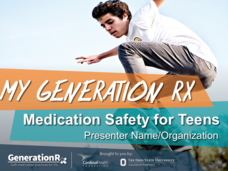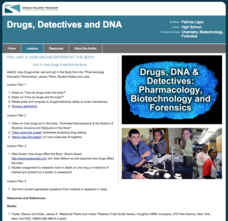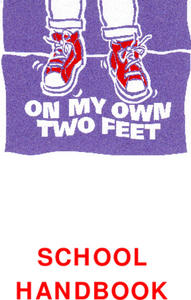PBS
Stories of Painkiller Addiction: Prescription Drug Abuse Awareness Campaign
The I-STOP law was designed to regulate the distribution and tracking of prescription drugs. After reading an article about its signing and implementation, middle and high schoolers work together to come up with their own ideas for an...
Scholastic
Drugs + Your Body—It Isn’t Pretty
Drugs can affect all parts of the body including teeth, skin, heart, brain, and lungs. Use an interactive that explores topics like addiction and the brain, steroid use and skin breakouts, methamphetamine use and rotting teeth, smoking...
National Institute on Drug Abuse
The Brain's Response to Drugs
Marijuana affects the brain differently than inhalants, which have a different effect than opioids. Elementary and middle school classes read about these drugs as well as nicotine, methamphetamine, hallucinogens, and steroids before...
Foundation for a Drug-Free World
The Truth About Drugs
Teenagers hear many messages about drugs from advertisements, their peers, their teachers, and their parents. But who is lying? What is the truth? A thorough, thoughtful unit takes a purposeful look at drug education, drug culture, and...
Scholastic
Stress and Drug Abuse
Young scholars identify the different causes of stress. For this health science lesson plan, students find the connection between stress and drug abuse. They discuss about the different kinds of stress they experience everyday.
Generation Rx
Medication Safety for Teens
The most valuable way to protect teenagers from prescription drug abuse is to equip them with knowledge. An informative slideshow covers various aspects of prescription drug safety, including the importance of keeping one's prescription...
US National Library of Medicine
Drug Use and Abuse: Past and Present
Pick your poison: tobacco, alcohol, opiates, cocaine, or marijuana. An online exhibition launches a research project that asks groups to select one of the five drugs and gather information on how the use of the drug and the regulations...
Kenan Fellows
Unit 3: How Drugs Enter/Exit the Body
The third of a four-part series on Pharmacology teaches scholars how drugs enter and exit the body, how they act inside the body, how they affect the brain, and more. Over the course of the unit, groups complete two labs and one...
Nemours KidsHealth
Drugs: Grades 9-12
What do drugs do to the body and to the mind? What are the dangers of using drugs? How can teens respond to the pressure to use drugs? After reading a series of articles related to drug use and abuse, class members prepare a skit to...
Florida Department of Health
Understanding the Risk of Substance Abuse Unit
Teenage brains are different! Understanding that the teenage brain is still developing and thus more impacted by substance abuse is the key concept in a three-lesson high school health unit. Participants learn about how the brain and...
Council for the Curriculum, Examinations and Assessment
Drugs Awareness
The final lesson in a series of 10 focusing on Social, Physical, Emotional, Cognitive and Spiritual (SPECS) health investigates the effects of legal and illegal substances, their risks, and the consequences of their misuse.
Nemours KidsHealth
Drugs: Grades 3-5
Two lessons take a close look at drug prevention. The first lesson, split into two sessions, challenges learners to gather information from an article, answer questions, then create a poster that encourages others to stay away from...
PBS
Stories of Painkiller Addiction: Myth or Fact
Are opioids the most abused drug after marijuana? How hard is it for young people to obtain painkillers without a prescription? Middle and high schoolers explore the growing epidemic of opioid addiction with a lesson that prompts them to...
National Association of School Nurses
Learn to Be Smart and Safe with Medicine
The stated purpose of a school tool kit is to help schools implement teen prescription drug abuse awareness programs. The kit includes actions that groups can take in the school, with parents, and in the community at large.
Department of Education (Ireland)
On My Own Two Feet School Handbook
The "On My Own Two Feet" School Handbook describes a carefully scaffolded, richly detailed substance abuse program designed for middle and high schools. Chapters look at approaches to prevention, suggestions for organizing and...
The New York Times
Investigating the Heroin and Prescription Opioid Epidemic
How bad is the opioid crisis in America? Has it gotten worse in the last few decades? Why? High schoolers delve into these questions with a thorough and thoughtful lesson from The New York Times on heroin prescription opioids. Starting...
Department of Education (Ireland)
Consequences
11 lessons, designed to be used in consecutive order, ask middle and high school scholars to consider the effects of various drugs and the consequences of taking them for themselves and their families. They also develop the communication...
PBS
Stories of Painkiller Addiction: The Cycle of Addiction
Drug addiction, including prescription drug addiction, begins with a reason that's different for every user. High schoolers learn more about the reasons people begin abusing drugs with a set of videos and worksheets that discuss four...
PBS
Stories of Painkiller Addiction: Learning About Opioids
Feeling high is not the only side effect of abusing prescription opioids. Middle and high schoolers learn more about specific painkillers, including Fentanyl, Oxycodone, and Clonazepam, as well as their common brand names and extensive...
PBS
Stories of Painkiller Addiction: Contemplating Nature vs. Nurture
Does having an addict in your family make it more likely to become one yourself? Explore the genetic risk factors, as well as the prominent environmental influences, for substance addiction in a lesson that encourages awareness and open...
Carfleo
Substance Use and Abuse
What is substance abuse? What is the difference between a depressant and a stimulant? Here is a comprehensive unit on drug use, including three lessons with such activities as categorizing and defining key terms, identifying issues...
RAND Corporation
Project ALERT
Why do people use drugs? What are the consequences? The alternatives? How can young people resist the pressures to use drugs? The Project Alert drug prevention program provides middle schoolers with the information they need and the...
Kenan Fellows
Unit 4: The Brain
Drugs interact with the brain to alter moods, emotions, and behaviors by changing the brain's chemistry, perceptions, and interactions. The final lesson in the Pharmacology unit shows scholars experiments, has them complete four labs,...
Discovery Education
Our Brain and Body on Opioids
Use a presentation that explores the world of prescription opioids. Learners look at the way the brain responds to the drugs and the long terms effects opioids have on the brain and body. At the end of the lesson plan, groups create a...
Other popular searches
- Drug Abuse Posters
- Drug Abuse Lesson Plans
- Alcohol and Drug Abuse
- Drug Abuse Prevention
- Prescription Drug Abuse
- Effects of Drug Abuse
- Drug Abuse Play
- Drug Abuse Projects
- Drug Abuse Survey
- Drug Abuse and Prevention
- Drug Abuse Factors
- World Drug Abuse

























